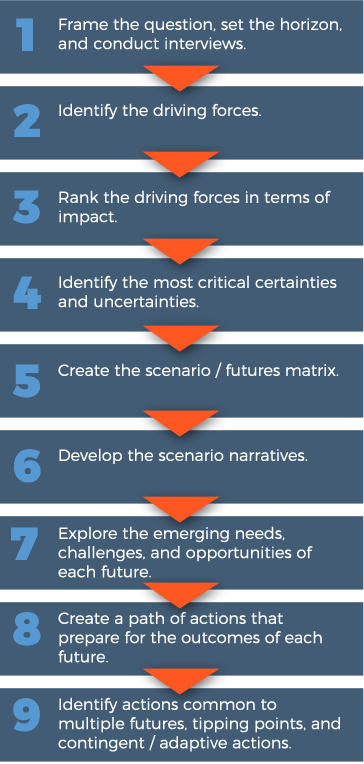
Who Can Benefit From Scenario Planning?
Forward-looking organizations and communities plan for the near, mid, and longer terms at the same time. Scenario planning can provide the strategic foresight needed to do so.
Scenario planning is most commonly applied in Governmental, Non-Profit, and Private Sector Organizations that operate in highly dynamic planning environments. The approach can be exploratory and serve as the front end of a longer-term conversation with stake-holders about a critical strategic issue. Or it can be focused and detailed in order to make a complex, potentially imminent strategic decision.
The approach is used by Applied Planning Professionals to increase the viability of their planning initiatives by considering a broader range of possible futures—not just the most probable or desirable ones. Planning initiatives that are robust and flexible are also more adaptable and responsive to whatever lies ahead.
Scenario planning is used by Community Leaders to initiate deliberative, problem-solving conversations with diverse interests when addressing an important community issue. The objective is to begin aligning stakeholders as part of a longer-term planning process.
The method is used by Leadership Teams looking to chart their future course in uncertain planning environments. Scenario planning is used to explore organizational drivers and planning uncertainties that relate to key strategic issues. The process engages diverse perspectives to increase awareness of still emerging opportunities and challenges and to identify possible options to leverage or mitigate them.
Scenario planning is used by Academic and Consulting Research Teams to establish a credible range of possible scenario futures to address an applied research question. Researchers apply quantitative methods and tools to analyze scenarios, individually and collectively, to identify robust and optimal solutions for decision makers to consider.
Scenario planning can assist Management Teams in Transition. The approach can facilitate the transferring of institutional memory and strategic insights from Departing Managers to continuing staff. Similarly, Incoming Leaders can use the process to galvanize newly formed technical and management teams to identify and address common strategic objectives.


